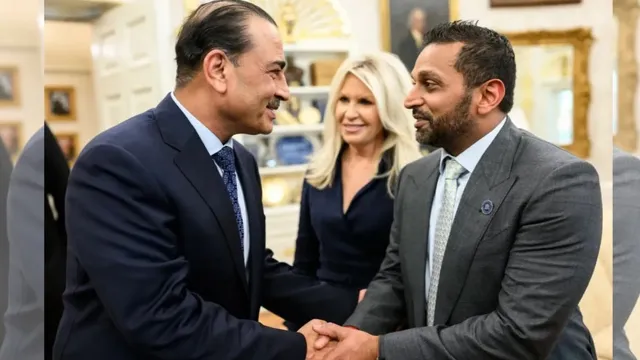- By Shivangi Sharma
- Tue, 30 Sep 2025 06:39 PM (IST)
- Source:JND
A picture of FBI Director Kash Patel greeting Pakistani Army Chief Field Marshal Asim Munir at the White House has drawn mass outrage in the Indian diaspora. The photo, made public along with official images of September 25 talks between US President Donald Trump and Pakistani Prime Minister Shehbaz Sharif, became viral in no time, generating arguments about loyalty, ethics, and the politics of global diplomacy.
Patel, the Indian-origin Hindu whose family originates from Gujarat, attended the Oval Office meeting with senior American officials such as Vice President JD Vance, Secretary of State Marco Rubio, and Deputy White House Chief of Staff Stephen Miller. The meeting, aimed at improving US-Pakistan ties, witnessed Patel greeting Munir warmly, a move that immediately attracted negative attention on social media.
Diaspora Responds With Shock
For most in the Indian diaspora, the handshake represented a betrayal. Munir has already issued statements highlighting "stark differences between Hindus and Muslims," and his linkage with attacks on India, including the Pahalgam incident, has added to the sensitivity. People argued that Patel's gesture undermined the Indian community's assumptions about what diaspora leaders were expected to do, especially regarding issues related to India-Pakistan relations.
ALSO READ: Trump Announces 20-Point Peace Plan To End Israel-Gaza War But With Stern Warning To Hamas
Social Media Backlash
X users were particularly vocal. One post read, “Gujju-export Kash Patel, Sanghi fanboy once hailed as India's saviour in FBI, now rolling red carpet for Asim Munir… the same man linked to Pahalgam attack.” Another added, “While Munir openly calls for jihad against Hindus, the optics of such interactions reveal a disturbing willingness to appease adversarial actors for crypto deals and rare earth minerals.”
#Breaking: Gujju-export Kash Patel, Sanghi fanboy once hailed as India's savior in FBI, now rolling red carpet for Asim Munir... the same man linked to Pahalgam attack.
— زماں (@Delhiite_) September 28, 2025
Sanghis were drooling over Patel's 'Hindu pride' but look...their hero is hugging someone who attacked India. pic.twitter.com/XLrdNtrLK3
I still remember how Sanghis in India were getting orgasm thinking that Gujju Kash Patel will head FBI and will protect Indian interests.
— Roshan Rai (@RoshanKrRaii) September 28, 2025
Here is him meeting Asim Munir, The mastermind of Pahalgam Terror attack in India. pic.twitter.com/rr4XzsEN4y
The backlash comesamid broader concerns over international diplomacy and strategic interests. Many argued that India must continue to focus on self-reliance in national security and diplomacy, particularly amid rising global tensions and tariff disputes with the US. While the meeting was official and protocol-driven, its optics have ignited a debate over personal identity, national loyalty, and the ethical expectations placed on individuals of Indian origin in global positions of power.

